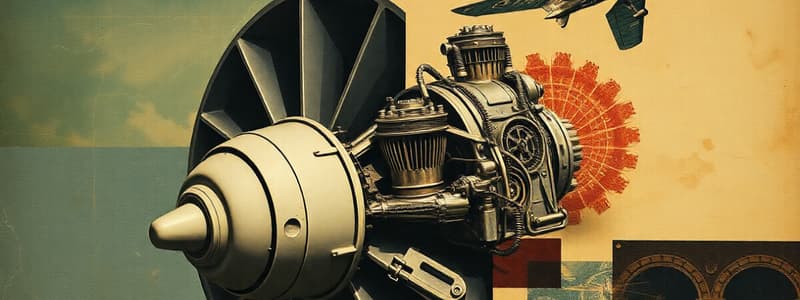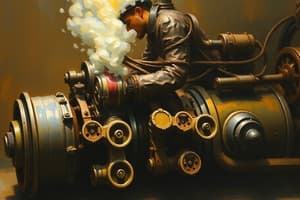Podcast
Questions and Answers
What principle do airplane engines operate based on?
What principle do airplane engines operate based on?
- Bernoulli's principle
- Third law of Newton (correct)
- Conservation of energy
- Law of thermodynamics
How does an increase in the mixture entering the motor affect the work done by the piston?
How does an increase in the mixture entering the motor affect the work done by the piston?
- It only affects the temperature
- It decreases the work done
- It causes no change in the work done
- It increases the work done (correct)
What is the primary function of a turbopropeller?
What is the primary function of a turbopropeller?
- To cool the engine components
- To increase the weight of the aircraft
- To reduce fuel consumption
- To generate thrust using combustion gases (correct)
What happens to the momentum of the airplane as gases are expelled from the engine?
What happens to the momentum of the airplane as gases are expelled from the engine?
In the equation m_air * v_air = m_gases * v_gases = m_avion * v_avion, what does this express?
In the equation m_air * v_air = m_gases * v_gases = m_avion * v_avion, what does this express?
During which stage does the intake valve open to allow air and fuel into the cylinder?
During which stage does the intake valve open to allow air and fuel into the cylinder?
What happens to the valves during the compression stage?
What happens to the valves during the compression stage?
Which action occurs when the piston moves downward during the combustion stage?
Which action occurs when the piston moves downward during the combustion stage?
Which statement accurately describes the exhaust stage?
Which statement accurately describes the exhaust stage?
How does the piston move during the admission stage?
How does the piston move during the admission stage?
Flashcards
Turbo Compressor Work
Turbo Compressor Work
The work a motor does depends on more than just the fuel and oxygen mixture. More mixture means more piston work.
Airplane Engine Thrust
Airplane Engine Thrust
Airplane engines use the reaction principle: expelling gases backward creates forward movement and thrust.
Turbopropeller Function
Turbopropeller Function
A turbopropeller uses hot gases from combustion to push the plane forward.
Momentum Principle (Airplane)
Momentum Principle (Airplane)
Signup and view all the flashcards
Turbopropeller Process
Turbopropeller Process
Signup and view all the flashcards
Four-Stroke Engine Cycle
Four-Stroke Engine Cycle
Signup and view all the flashcards
Admission Stage
Admission Stage
Signup and view all the flashcards
Compression Stage
Compression Stage
Signup and view all the flashcards
Combustion Stage
Combustion Stage
Signup and view all the flashcards
Exhaust Stage
Exhaust Stage
Signup and view all the flashcards
Study Notes
Four-Stroke Engine
- Engine work depends on mixture amount (fuel + O2)
- Increased mixture = increased piston work
Airplane Engines
- Based on Newton's 3rd Law (action and reaction)
- Engines use kinetic energy to propel plane
- Momentum equation: mass of gases * velocity of gases = change in airplane momentum
Turbopropeller
- The schematic shows air intake, combustion chamber, turbine, and exhaust.
- Fuel and air ignite inside combustion chamber, creating hot gases
- High-velocity exhaust creates thrust, propelling the aircraft forward
- Boyle's Law (P*V = constant) relates pressure, volume, and temperature of the expanding gases. Higher temperature means higher pressure and speeds.
Studying That Suits You
Use AI to generate personalized quizzes and flashcards to suit your learning preferences.

